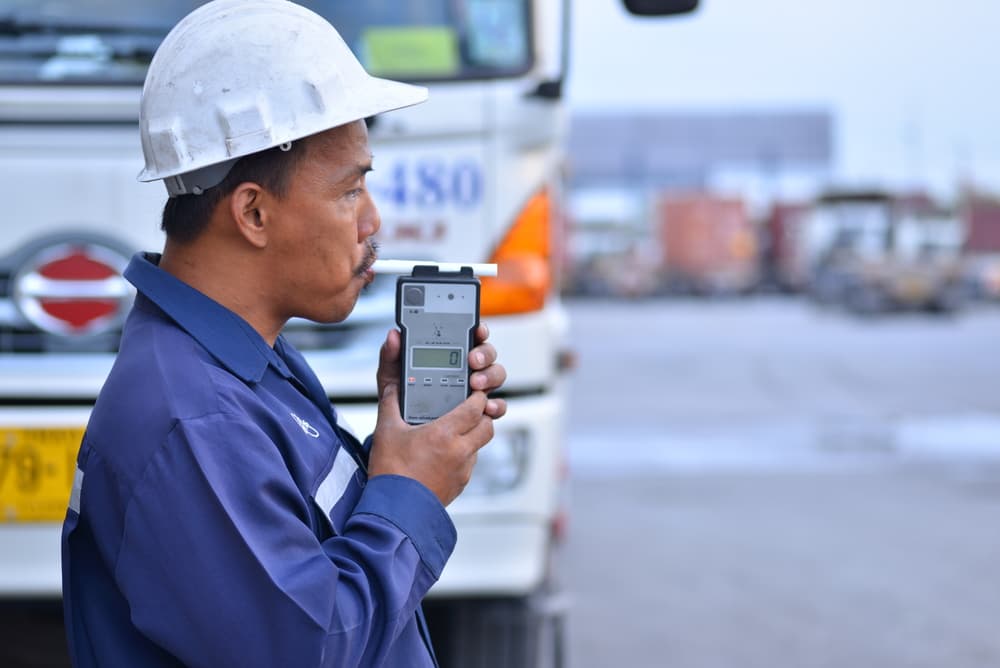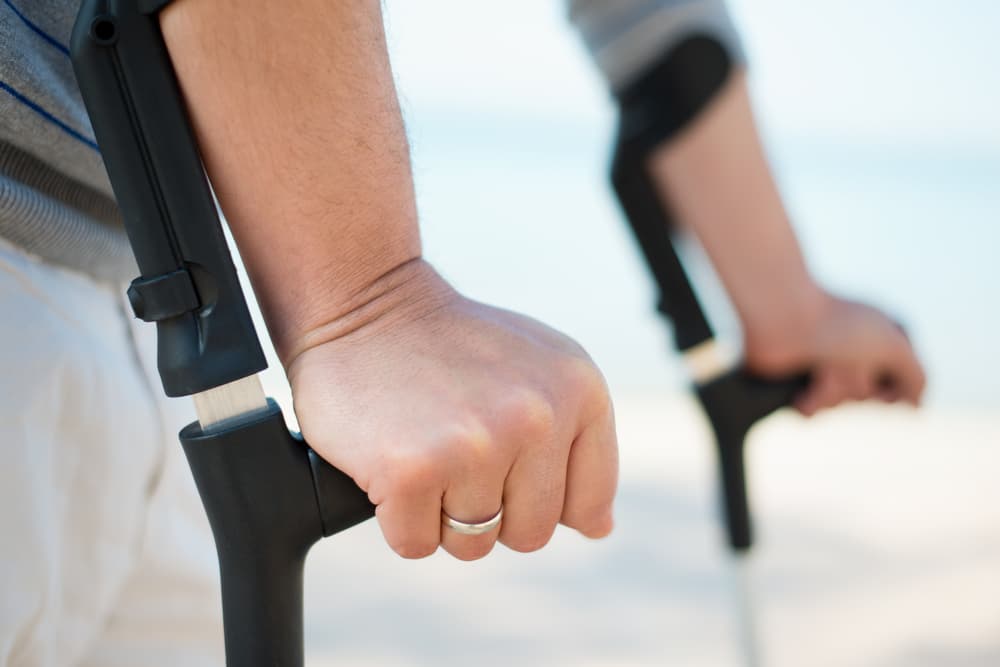When drivers choose to get behind the wheel of a large commercial truck or tractor-trailer while intoxicated, they significantly increase their chances of causing a serious accident. Intoxicated truck drivers may experience delayed reflexes, delayed reaction time, limited muscular coordination, impaired judgment, and poor vision, resulting in a high-speed crash.
If you suffered injuries in a truck accident that an intoxicated driver caused, you may have legal options. Specifically, you can file a personal injury claim or lawsuit against the truck driver, trucking company, or their insurer. A knowledgeable truck accident attorney in Chicago can handle the claims-filing and litigation processes for you and work to maximize the financial recovery you receive for your injuries.
Schedule a Free Initial Consultation Today!
How Alcohol Intoxication Affects Truck Drivers

Alcohol intoxication significantly affects a truck driver's ability to drive safely, posing severe risks to themselves and others on the road. The effect of alcohol on a truck driver's physical and cognitive functions is extensive, leading to a heightened potential for accidents.
One of the primary consequences of alcohol intoxication is impaired coordination and motor skills. Truck drivers require precise control over their vehicles, especially given the size and weight of trucks. Alcohol diminishes fine motor skills, making it challenging for drivers to maintain proper control, navigate turns, or respond effectively to sudden changes in traffic conditions.
Altered judgment is another critical effect of alcohol intoxication. Truck drivers need sound judgment to assess situations, make split-second decisions, and respond to potential hazards. Intoxication clouds this ability, leading to impaired decision-making that can result in risky maneuvers, late braking, or failure to recognize and avoid dangers on the road.
Alcohol also affects a truck driver's reaction time – a crucial factor in preventing accidents. Slowed reactions due to intoxication increase the likelihood of collisions, especially in situations that demand quick responses, such as avoiding obstacles, braking suddenly, or adjusting to changes in traffic flow.
Maintaining attention and focus is also essential for safe truck operation, but alcohol intoxication disrupts this aspect of a driver's cognitive function. Impaired concentration can result in distracted driving, where the driver may fail to notice traffic signals, signs, or the presence of other vehicles, leading to potentially catastrophic consequences.
Fatigue is another common issue in the trucking industry, and alcohol exacerbates this problem. Intoxicated truck drivers may experience heightened drowsiness and reduced alertness, further compromising their ability to stay vigilant during long journeys. This increases the risk of accidents due to delayed responses or even falling asleep at the wheel.
Overall, alcohol intoxication creates a hazardous combination of physical and cognitive impairments for truck drivers. The consequences extend beyond the impaired individual, affecting the safety of everyone sharing the road. Recognizing and addressing the dangers of alcohol-impaired truck driving is crucial for preventing accidents, injuries, and fatalities in the transportation industry. Moreover, strict adherence to sobriety regulations and regular monitoring of alcohol consumption are essential measures to uphold the safety standards required for commercial truck drivers.
Types of Accidents that Result from Intoxicated Truck Drivers
Accidents involving intoxicated truck drivers can have devastating consequences due to the size and weight of commercial trucks. Various types of truck accidents may result from alcohol intoxication, each posing significant risks to the safety of the driver, other road users, and property.
One common type of truck accident involving intoxicated drivers is the rear-end collision. Alcohol affects a driver's judgment and reaction time, making it challenging for them to maintain a safe following distance. Intoxicated truck drivers may fail to recognize slowing or stopped traffic ahead, leading to rear-end collisions that can cause extensive damage and severe injuries.
Another type of accident is the jackknife incident, where the truck trailer swings outward, resembling the shape of a folding jackknife. Intoxicated drivers may struggle to maintain control of their vehicles, especially during sudden maneuvers. A jackknife accident can result in the truck skidding across the road, colliding with other vehicles and obstacles, and posing a significant threat to anyone in its path.
Rollover accidents are also common when alcohol impairs a truck driver's ability to navigate turns or curves safely. Intoxicated drivers may overcorrect or fail to adjust to changing road conditions, leading to a loss of control and the truck overturning. Rollover accidents often result in extensive property damage, injuries, and, in severe cases, fatalities.
Head-on collisions involving intoxicated truck drivers are particularly dangerous. Impaired judgment can lead to lane departure or failure to yield the right-of-way, resulting in the truck colliding with oncoming traffic. The force of a head-on collision involving a large truck can lead to catastrophic injuries and significant damage to smaller vehicles involved.
Underride accidents occur when a smaller vehicle becomes trapped beneath the trailer of a large truck. Alcohol-impaired truck drivers may fail to notice smaller vehicles alongside or in front of them, increasing the risk of underride accidents during lane changes, turns, or sudden stops. Underride accidents often result in severe injuries or fatalities for occupants of the smaller vehicle.
Side-impact collisions, also known as T-bone accidents, can occur when an intoxicated truck driver fails to yield or runs a red light. These collisions can have severe consequences, especially for vehicle occupants struck from the side. The collision may cause extensive damage and lead to injuries, including those with long-term consequences.
Accidents involving intoxicated truck drivers not only pose immediate risks but can also have long-lasting effects on the victims and their families. Preventing such incidents requires stringent enforcement of sobriety regulations, regular monitoring of truck drivers, and comprehensive education on the dangers of alcohol impairment in the commercial transportation industry.
If you recently suffered injuries in one of these types of truck accidents, an experienced truck accident attorney can review your circumstances with you and determine your legal options.
Injuries in Commercial Truck Crashes
Victims of truck accidents involving intoxicated drivers often sustain a range of injuries, varying in severity and long-term impact. The size and weight of commercial trucks intensify the potential for severe injuries in such incidents. Some common types of injuries that truck accident victims suffer due to intoxicated drivers include:

- Whiplash, neck and back injuries
- Traumatic brain injuries (TBIs)
- Spinal cord damage
- Broken bones
- Internal organ damage or bleeding
- Burn injuries
- Amputations
- Soft tissue muscular contusions
- Wrongful death
The diverse range of injuries underscores the severity of truck accidents involving intoxicated drivers. Seeking prompt medical attention, ongoing rehabilitation, and legal assistance are essential for victims to navigate the physical, emotional, and financial challenges associated with these injuries.
Holding the responsible parties accountable through legal action may provide a path to obtaining compensation for the extensive damages you suffered in your accident.
How to Legally Prove a Truck Accident Claim or Lawsuit
Successfully proving the legal elements of a truck accident case involving drunk driving requires a comprehensive approach, meticulous gathering of evidence, and effective legal representation. Important elements in a truck accident claim or lawsuit include:
- Establishing Negligence – Proving negligence is fundamental in a truck accident case. It involves demonstrating that the truck driver had a duty of care, breached that duty through intoxicated operation, and that the breach directly caused the accident and resulting injuries. This often requires a thorough investigation into the circumstances leading up to the accident.
- Demonstrating Intoxication – Establishing the truck driver's intoxication is crucial. This involves presenting evidence such as police reports, field sobriety test results, blood alcohol concentration (BAC) levels, and any admissions that the driver made at the scene. Witness statements and surveillance footage can further support the claim of an intoxicated operation.
- Proving Causation – It's essential to establish a direct link between the truck driver's intoxication and the occurrence of the accident. This requires demonstrating that the impaired state of the driver was a substantial factor in causing the collision and subsequent injuries. Expert testimony, accident reconstruction, and medical evidence may be necessary to establish causation.
- Documenting Injuries – Comprehensive documentation of injuries sustained in the truck accident is crucial. Medical records, diagnostic reports, and expert medical testimony can help establish the extent of the injuries and link them directly to the intoxicated truck driver's actions.
- Collecting Eyewitness Testimony – Eyewitness accounts can provide valuable testimony regarding the events leading up to the accident and the behavior of the intoxicated truck driver. Witness statements can strengthen the case by providing additional perspectives on the driver's impairment and its effect on the accident.
- Reviewing Maintenance Records – Investigating the truck's maintenance records can reveal if any mechanical issues or defects contributed to the accident. This information can be essential in establishing liability – especially if poor vehicle maintenance aggravated the consequences of the intoxicated operation.
- Examining Employment Records – If the at-fault driver worked for a trucking company, examining employment records may be critical. This can help determine if the company adhered to proper hiring practices, conducted background checks on prospective drivers, and enforced policies against intoxicated driving.
- Seeking Expert Testimony – Expert witnesses, such as accident reconstruction specialists or toxicologists, can provide professional opinions on the circumstances surrounding the accident. Their expertise can bolster the case by offering insights into how the driver's intoxication contributed to the collision.
Engaging with an experienced personal injury attorney is pivotal in navigating the complexities of proving legal elements in a truck accident case involving drunk driving. A skilled personal injury attorney can guide you through the legal process, present all relevant evidence in your case, and advocate for fair compensation for the physical, emotional, and financial damages you incurred.
Recovering Favorable Compensation for Your Truck-accident Injuries
Truck accident victims affected by intoxicated truck driving may be entitled to recover damages to compensate for their extensive losses and hardships. These damages aim to address the financial, physical, and emotional toll resulting from the accident. Several key types of damages that a truck accident victim may recover include compensation for:
- Lost Income – If the victim cannot work due to injuries, they can seek compensation for lost income. This includes income lost during the recovery period and potential future earnings if the injuries result in a long-term or permanent disability.
- Medical Expenses – Accident victims are entitled to compensation for all medical costs associated with injuries sustained in the accident. This includes emergency medical treatment, hospitalization, medical procedures, medication, physical therapy, and ongoing healthcare expenses.
- Property Damage – Damages for property loss or damage cover the repair or replacement costs of the victim's vehicle and any personal belongings that sustained damage in the accident.
- Loss of Consortium – Damages for loss of consortium compensate victims for the negative effect of injuries on their relationships with family members. This can include the loss of spousal companionship, intimacy, and support.
- Emotional Distress – In some cases, victims may be eligible for damages related specifically to emotional distress resulting from the trauma of the accident. This can encompass fear, anxiety, and other psychological repercussions, such as post-traumatic stress disorder (PTSD).
- Pain and Suffering – Non-economic damages, such as pain and suffering, aim to compensate victims for the physical and emotional distress they experienced due to the truck accident, including depression, physical pain, and anxiety.
- Wrongful Death Damages – In cases where the truck accident leads to the accident victim’s untimely death, surviving family members may pursue wrongful death damages. These can cover loss of financial support from the decedent, burial and funeral expenses, and compensation for the emotional effect of losing a loved one prematurely.
- Future Medical Expenses – In cases where the accident victim requires ongoing medical care or future treatments, compensation may be available for anticipated medical expenses. This ensures the victim is adequately covered for future healthcare needs resulting from the truck accident.
- Loss of Enjoyment of Life – Damages for loss of enjoyment of life compensate accident victims for the negative effects their injuries have on their ability to engage in hobbies, recreational activities, and social activities they once enjoyed.
Recovering these damages requires a thorough understanding of the specific circumstances surrounding your truck accident, the extent of your injuries, and the long-term consequences you may experience. An experienced truck accident attorney can assess the full scope of your damages and pursue the fair compensation you need for your truck accident losses.
Speak with an Experienced Truck Accident Lawyer Today
If you recently sustained injuries in a truck accident, you need to get the legal help that you need as quickly as possible. Ordinarily, victims of truck accidents must file a personal injury lawsuit within two years of their accident date. Otherwise, the statute of limitations may prevent them from recovering damages for their injuries.
A skilled Chicago personal injury lawyer in your jurisdiction can file a timely claim or lawsuit in your case and work to secure the financial recovery you need to become whole again.



